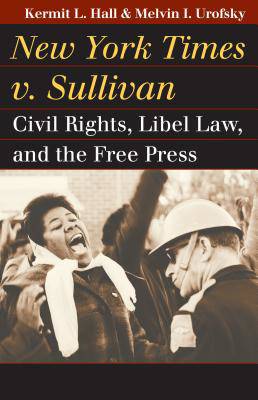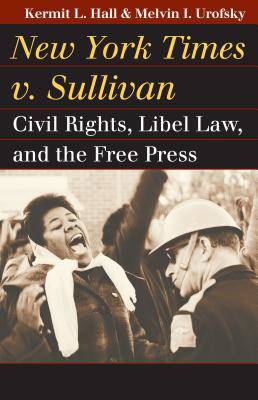
- Retrait gratuit dans votre magasin Club
- 7.000.000 titres dans notre catalogue
- Payer en toute sécurité
- Toujours un magasin près de chez vous
- Retrait gratuit dans votre magasin Club
- 7.000.000 titres dans notre catalogue
- Payer en toute sécurité
- Toujours un magasin près de chez vous
New York Times v. Sullivan
Civil Rights, Libel Law, and the Free Press
Kermit L Hall, Melvin I Urofsky
26,95 €
+ 53 points
Format
Description
Illuminating a classic case from the turbulent civil rights era of the 1960s, two of America's foremost legal historians--Kermit Hall and Melvin Urofsky--provide a compact and highly readable updating of one of the most memorable decisions in the Supreme Court's canon. When the New York Times published an advertisement that accused Alabama officials of willfully abusing civil rights activists, Montgomery police commissioner Lester Sullivan filed suit for defamation. Alabama courts, citing factual errors in the ad, ordered the Times to pay half a million dollars in damages. The Times appealed to the Supreme Court, which had previously deferred to the states on libel issues. The justices, recognizing that Alabama's application of libel law threatened both the nation's free press and equal rights for African Americans, unanimously sided with the Times. As memorably recounted twenty years ago in Anthony Lewis's Make No Law, the 1964 decision profoundly altered defamation law, which the Court declared must not hinder debate on public issues even if it includes "vehement, caustic, and sometimes unpleasantly sharp attacks on government and public officials." The decision also introduced a new First Amendment test: a public official cannot recover damages for libel unless he proves that the statement was made with the knowledge that it was false or with reckless disregard of whether it was false. Hall and Urofsky, however, place a new emphasis on this iconic case. Whereas Lewis's book championed freedom of the press, the authors here provide a stronger focus on civil rights and southern legal culture. They convey to readers the urgency of the civil rights movement and the vitriolic anger it inspired in the Deep South. Their insights place this landmark case within a new and enlightening frame.
Spécifications
Parties prenantes
- Auteur(s) :
- Editeur:
Contenu
- Nombre de pages :
- 232
- Langue:
- Anglais
- Collection :
Caractéristiques
- EAN:
- 9780700618033
- Date de parution :
- 06-09-11
- Format:
- Livre broché
- Format numérique:
- Trade paperback (VS)
- Dimensions :
- 142 mm x 219 mm
- Poids :
- 308 g







